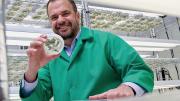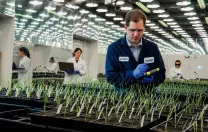Photosynthesis combines sunlight, carbon dioxide, water, and minerals to make organic compounds: the food that sustains plant growth. But roughly 18 percent of the world’s flowering plant-species have evolved a superior form of this process: C4 photosynthesis. Such plants—corn is one example—have wreath-like rings of cells that allow them to exclude most oxygen from the chemical reactions that occur during photosynthesis, thereby making that process much more efficient under conditions of drought, high temperatures, or limited nitrogen (a key ingredient for photosynthesis that is present in both soil and chemical fertilizers).
Daniel Voytas, an expert on the genetics of plant biology who directs the Center for Genome Engineering at the University of Minnesota, and is the chief scientific officer of Calyxt, a specialty food ingredients company that edits plant genomes to enhance them (see main text), also advises an ambitious Bill and Melinda Gates Foundation-funded project to bring C4 photosynthesis to rice. The project, run by the University of Oxford, aims to engineer a complex combination of changes to the plant’s cellular structure in order to keep oxygen away from photosynthetic chloroplasts, and to supply the genetic instructions for carrying out the chemical reaction that produces a four-carbon molecule (hence the C4 in the name). The components necessary to achieve this exist in the plant, but require rearrangement to work effectively.
If the project succeeds, the benefits could be enormous. Rice yields could increase as much as 50 percent, or farmers could produce the same-size harvest using less water and fertilizer, an environmental benefit that also makes the plants more resilient to climatic fluctuations. That’s important because rice, which grows best in a narrow temperature range, provides a large proportion of the calories in many developing countries in East and Southeast Asia, where much of future global population growth is likely to occur. Production of this staple grain has already plateaued in many of these areas, even as the river deltas where rice grows best are sinking in Vietnam, Thailand, Myanmar, and Bangladesh, leaving the fields vulnerable to inundation by rising seas.
The same technique, Voytas adds, could be applied not only to other popular foods, such as wheat, potatoes, soybeans, and apples, but also to “orphan crops” like cassava, neglected by breeders but nevertheless a staple of the African diet. His research, he says, is driven principally by a fascination with plant biology, but “It’s also been very satisfying to see how the technology can be applied to address pressing problems, be they stresses induced by climate change, or the need to make better, healthier food.”










